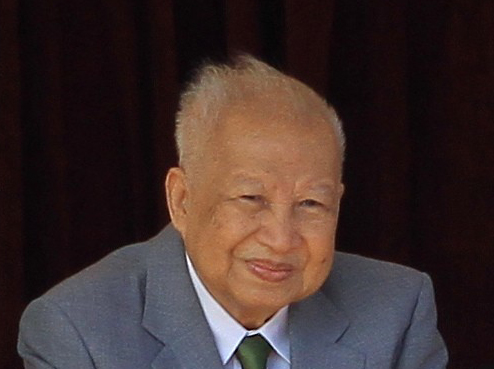It is unlikely that revelations about the eventful life of Norodom Sihanouk will materialise – everything and anything that could be said and written about His Majesty already has been. Undoubtedly, he was one of the most colourful personalities of the 20th century. No more, no less than a legend.
Few people in the world have influenced the fate of their nation over such a long period of time as Sihanouk. In more than six decades as a politician, in countless political offices, he has experienced highs and lows in dramatic dimensions that have mirrored the turbulent history of his country, Cambodia.
Born in 1922, France elevated him to the King of Cambodia when he was just 18 years old. The Francophile monarch thanked his backers in his own way: After much toil and tireless effort, Cambodia gained independence in 1953 – not without French renitence, but peacefully in the diplomatic arena. It was Sihanouk’s biggest success.
In the years that followed, he successfully excluded Cambodia from the war in Indochina. It was a balancing act that was venturesome and ingeniously exercised. Though Sihanouk – who had abdicated in favour of his father in 1955, but endured as the main political decision-maker – failed to notice how strongly the foreign affairs antagonisms affected domestic politics. While the vast majority of his people enjoyed a golden age of peace and prosperity until the late 1960s, his intelligence service used gory violence to target his few political opponents. His catch-all party Sangkum Reastr Niyum (People’s Socialist Community) included a wide variety of political factions which – even a few leftists were represented – was dominated by right-wing subgroups. In this period, Sihanouk was a man of action who brought modernity to Cambodia, but he also possessed behavioural traits that are common in undemocratic leaders: he was intolerant to criticism, over confident in his capabilities and had the misplaced assumption that he was Cambodia.

Born in 1922, France elevated him to the King of Cambodia when he was just 18 years old.
As history has shown, he was not. In 1970, right-wing military officers toppled Sihanouk when he was abroad. Soon after, Cambodia perished in a civil war while its former head of state led an exile government from Pyongyang. And he found new allies: with the help of radical communists – which Sihanouk called the ‘Khmer Rouge’ – he hoped to regain political influence for himself and political independence for his country, but this undertaking ended in tragedy. Upon returning to Cambodia in 1975, he was placed under house arrest – although he held office as formal head of state until 1976. A prisoner in his own palace, he feared his execution daily. He survived, but many of his children and relatives did not. It is commonly believed that his good relations with leading politicians in China saved his life.
When the Vietnamese invaded in December 1978, he found himself again in exile. Pressured by China and the United States, he adhered to an unholy coalition with the Khmer Rouge in the 1980s. He fought against the Soviet-backed Vietnamese occupation through military and diplomatic means but stood ready to advance reconciliation with its puppet government in Phnom Penh. After being a playing ground for foreign interests for many years, Cambodia found a political settlement with the end of the East-West confrontation. In November 1991, after thirteen years, Sihanouk returned from exile, celebrated overwhelmingly by 10,000 loyal followers.
His popularity was much stronger than that of the regime at that time but Sihanouk refrained from politics and instead ascended the throne, as the Cambodian constitution re-instated the monarchy with a parliamentary system of government. While the position of the king became more representative, he hoped his eldest son would ensure the political influence of the royalist movement. This was a misjudgement: after a bloody coup in 1997, the royalists lost their political relevance completely and worked themselves into the ground following numerous wrong decisions. Tired and helpless to prevent this downfall, Sihanouk abdicated in October 2004, and the Royal Palace has since failed to regain political significance.
Since his abdication, Beijing has become his major residence. Battling several carcinosis and other diseases, his public appearances in his home country have been reduced significantly. Long ago, he bowed out of daily politics – instead, he stands above it all. His political comments and observations posted on his own website have become much more rare. Most significantly, he still opposes the Khmer Rouge Tribunal, but despite all his faults and the burden of bearing responsibility for some parts of the earlier Khmer Rouge history, as Samdech Euv – ‘Mighty Grandfather’ – he still enjoys extensive popularity in Cambodia. Throughout many years of turmoil, he was a constant, a landmark – and a rare symbol for a devastated country. Its tragedy was Sihanouk’s tragedy. Fortunately, Cambodia’s history did not end in 1979, and its resurgence may fill nobody’s heart with more joy than that of the country’s greatest patriot, Norodom Sihanouk.
Dr Markus Karbaum has a PhD in political science and Southeast Asian studies. He is a consultant and lecturer at the Free University Berlin. His research focuses on Cambodia’s government as well as political, social and economic development in mainland Southeast Asia.

